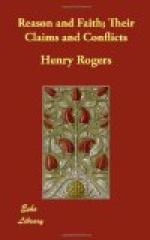unless we can cease to be finite. The objections
to the evidence itself are, as the same great author
observes, ’well worthy of the fullest attention.’
The a priori objection to miracles we have already
briefly touched. If that objection be valid, it
is vain to argue further; but if not, the remaining
objections must be powerful enough to neutralise the
entire mass of the evidence, and, in fact, to mount
to a proof of contradictions; ’not on this or
that minute point of historic detail,—but
on such as shake the foundations of the whole edifice
of evidence. It will not do to say, ’Here
is a minute discrepancy in the history of Matthew
or Luke as compared with that of ‘Mark or John;’
for, first, such discrepancies are often found, in
other authors, to be apparent, and not real,—founded
on our taking for granted that there is no circumstance
unmentioned by two writers which, if known, would
have been seen to harmonise their statements.
We admit this possible reconciliation readily enough
in the case of many seeming discrepancies of other
historians; but it is a benefit which men are slow
to admit in the case of the sacred narratives.
There the objector is always apt to take it for granted
that the discrepancy is real; though it may be easy
to suppose a case (a possible case is quite sufficient
for the purpose) which would neutralise the objection.
Of this perverseness (we can call it by no other name)
the examples are perpetual in the critical tortures
which Strauss has subjected the sacred historians.*”—
It may be objected, perhaps, that the gratuitous supposition
of some unmentioned fact—which, if mentioned,
would harmonise the apparently counter-statements
of two historians—cannot be admitted, and
is, in fact, a surrender of the argument. But
to say so, is only to betray an utter ignorance of
what the argument is. If an objection be founded
on the alleged absolute contradiction of two statements,
it is quite sufficient to show any (not the real,
but only a hypothetical and possible) medium of reconciling
them; and the objection is, in all fairness, dissolved.
And this would be felt by the honest logician, even
if we did not know of any such instances in point of
fact. We do know however, of many. Nothing
is more common than to find, in the narration of two
perfectly honest historians,—referring to
the same events from different points of view, or
for a different purpose,—the omission a
fact which gives a seeming contrariety to their statements;
a contrariety which the mention of the omitted fact
by a third writer instantly clears up.+
___
* The reader may see some striking instances of his
disposition to take the worse sense, in Beard’s
‘Voices of the Church.’ Tholuck truly
observes, too, in his strictures on Strauss, ’We
know how frequently the loss of a few words in one
ancient author would be sufficient to cast an inexplicable
obscurity over another.’ The same writer
well observes, that there never was a historian who,




